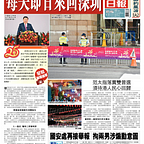How does Xiaomi gains HK users’ trust?
Smartphone competition in Hong Kong is quite intense, although the city is already a highly saturated market. Three foreign brands – Apple, Samsung and Sony Mobile – dominate the sector.
But surprisingly, China’s Xiaomi Technology enjoys tremendous support from local mobile phone users, especially for the low-end and mid-range categories.
The strong demand has prompted the Beijing-based technology company to raise its investment in Hong Kong by opening a new outlet in Mong Kok, part of its online-to-offline strategy to boost sales in the city.
Xiaomi Hong Kong will open another Mi Home store at Chong Hing Square in Mong Kok, its first on-street shop in the city. Currently, it has two Mi Home outlets, in Mong Kok and Causeway Bay, but they are both situated in commercial buildings, meaning shoppers have to enter the building and take a lift to get to the store.
The new on-street Mi Home is intended to widen its clientele beyond die-hard fans and online shoppers to reach the general public. And the new shop is located right at the heart of the shopping district, and very accessible to pedestrians, commuters and diners.
That should help the company bolster its brand exposure and help clear the way for an initial public offering later this year.
Xiaomi has been steadily developing in the Hong Kong market since it opened its first Mi Home in Mong Kok in September 2015. It took the firm around two years to open a second store in Causeway in June 2017.
It may take less than a year to open its third store on Nathan Road in Mong Kok if the new store opens in the first half this year.
Early this month, Xiaomi Hong Kong operations head Janine Luo Yan said sales of the two Mi Home stores jumped 71 percent in 2017 from the previous year, while overall sales of Xiaomi products grew 44 percent.
In fact, Xiaomi has been improving its market share in Hong Kong over the past 12 months. According to the figures from StatCounter, its share reached 5.44 percent in January, up from 4 percent a year earlier and ranked the fourth in the market.
Apple and Samsung are the top two players with 43 percent and 26 percent respectively, while LG Mobile is slightly ahead of Xiaomi as the No. 3 player.
It is not an easy accomplishment to rank fourth in such a competitive market, higher than its mainland rival Huawei Technologies.
It reflects the competitive advantage that Xiaomi has gained through a localized marketing campaign and product offerings.
Xiaomi, for example, has narrowed the time to market for its latest gadgets such as Mi Mix 2, currently the most high-end Xiaomi device featuring a full screen display with top hardware specifications, and Redmi 5 series, which was launched in Hong Kong just a few weeks after its debut in China in late December.
That could help Xiaomi fans in the city to buy its official products rather than purchase them from mainland agents.
But what Xiaomi is very proud of is the loyalty of its users, who call themselves “Mi fans”.
In Hong Kong, Mi fans have a chat group on social media to share their experiences in using Xiaomi products.
Xiaomi Hong Kong has even organized an annual Lunar New Year gathering for Mi Fans to celebrate the holiday and allow them to meet some Xiaomi senior officials who tell them the latest news about the company.
Such strategies do help the company bolster in market share and allow it to retain its position in a tough market environment.
The new Mi Home also bears a new mission, which is to sell more Xiaomi smart home products to Hongkongers.
Apart from smartphones and tablets, Xiaomi is also building a whole ecosystem of hardware from toothbrushes to electric fans to air and water purifiers.
Of course, not all of these products can be categorized as smart home products. But some of these products, such as fans, purifiers and rice cookers, can connect to the internet. Users can control these appliances through a dedicated smartphone app.
As Internet of Things could play a core part in the next generation mobile technology, Xiaomi could gain first-mover advantage in the market, especially for products that are easy to use and offer value for money.On Thursday Lei Jun, founder of Xiaomi, said his company is now the world’s No. 3 smartphone vendor, the only growing vendor in the market, thanks for its global expansion strategy.This year, Lei has set his sights on the mainland market with the aim of regaining the company’s position as the leading smartphone vendor in China within 10 quarters.While Hong Kong may not be a key battlefield for Xiaomi, it is an important strategic point for any Chinese company aiming to go global.
